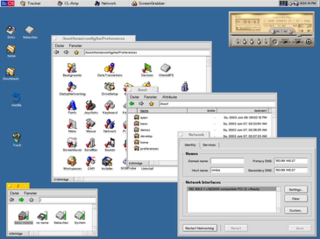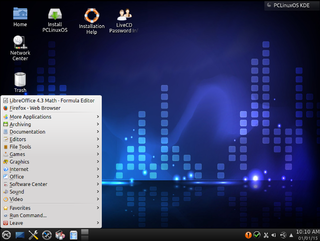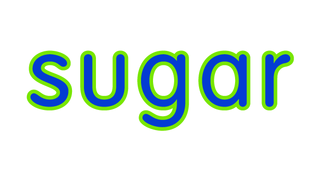
BeOS is an operating system for personal computers first developed by Be Inc. in 1990. It was first written to run on BeBox hardware.
Microsoft Windows was announced by Bill Gates on November 10, 1983. Microsoft introduced Windows as a graphical user interface for MS-DOS, which had been introduced two years earlier. The product line evolved in the 1990s from an operating environment into a fully complete, modern operating system over two lines of development, each with their own separate codebase.

Palm OS is a discontinued mobile operating system initially developed by Palm, Inc., for personal digital assistants (PDAs) in 1996. Palm OS was designed for ease of use with a touchscreen-based graphical user interface. It is provided with a suite of basic applications for personal information management. Later versions of the OS have been extended to support smartphones. Several other licensees have manufactured devices powered by Palm OS.
Universal Disk Format (UDF) is a profile of the specification known as ISO/IEC 13346 and ECMA-167 and is an open vendor-neutral file system for computer data storage for a broad range of media. In practice, it has been most widely used for DVDs and newer optical disc formats, supplanting ISO 9660. Due to its design, it is very well suited to incremental updates on both recordable and (re)writable optical media. UDF was developed and maintained by the Optical Storage Technology Association (OSTA).
Darwin is an open-source Unix-like operating system first released by Apple Inc. in 2000. It is composed of code developed by Apple, as well as code derived from NeXTSTEP, BSD, Mach, and other free software projects.

Mac OS 9 is the ninth and last major release of Apple's classic Mac OS operating system. Introduced on October 23, 1999, it was promoted by Apple as "The Best Internet Operating System Ever", highlighting Sherlock 2's Internet search capabilities, integration with Apple's free online services known as iTools and improved Open Transport networking. While Mac OS 9 lacks protected memory and full pre-emptive multitasking, lasting improvements include the introduction of an automated Software Update engine and support for multiple users.

Mac OS X Jaguar is the third major release of macOS, Apple's desktop and server operating system. It superseded Mac OS X 10.1 and preceded Mac OS X Panther. The operating system was released on August 23, 2002 either for single-computer installations, and in a "family pack," which allowed five installations on separate computers in one household. Jaguar was the first Mac OS X release to publicly use its code name in marketing and advertisements.

Haiku is a free and open-source operating system compatible with the now discontinued BeOS. Its development began in 2001, and the operating system became self-hosting in 2008. The first alpha release was made in September 2009, and the last was November 2012; the first beta was released in September 2018 and the second beta was released in June 2020.

PCLinuxOS, often shortened to PCLOS, is an x86-64 Linux distribution, with KDE Plasma Desktop, MATE and XFCE as its default user interfaces. It is a primarily free software operating system for personal computers aimed at ease of use. It is considered a rolling release.
Nucleus RTOS is a real-time operating system (RTOS) produced by the Embedded Software Division of Mentor Graphics, a Siemens Business, supporting 32- and 64-bit embedded platforms. The operating system (OS) is designed for real-time embedded systems for medical, industrial, consumer, aerospace, and Internet of things (IoT) uses. Nucleus was released first in 1993. The latest version is 3.x, and includes features such as power management, process model, 64-bit support, safety certification, and support for heterogeneous computing multi-core system on a chip (SOCs) processors.
magnussoft ZETA, earlier yellowTAB ZETA, was an operating system formerly developed by yellowTAB of Germany based on the Be Operating System developed by Be Inc.; because of yellowTAB's insolvency, ZETA was later being developed by an independent team of which little was known, and distributed by magnussoft. As of February 28, 2007 the current version of ZETA is 1.5. On March 28, 2007, magnussoft announced that it has discontinued funding the development of ZETA by March 16, because the sales figures had fallen far short of the company's expectations, so that the project was no longer economically viable. A few days later, the company also stopped the distribution of ZETA in reaction to allegations that ZETA constituted an illegal unlicensed derivative of the BeOS source code and binaries.

The USB mass storage device class is a set of computing communications protocols, specifically a USB Device Class, defined by the USB Implementers Forum that makes a USB device accessible to a host computing device and enables file transfers between the host and the USB device. To a host, the USB device acts as an external hard drive; the protocol set interfaces with a number of storage devices.

eComStation or eCS is an operating system based on OS/2 Warp for the 32-bit x86 architecture. It was originally developed by Serenity Systems and Mensys BV under license from IBM. It includes additional applications, and support for new hardware which were not present in OS/2 Warp. It is intended to allow OS/2 applications to run on modern hardware, and is used by a number of large organizations for this purpose. By 2014, approximately thirty to forty thousand licenses of eComStation had been sold.

Sugar is a free and open-source desktop environment designed for interactive learning by children. Copyright by SugarLabs. Developed as part of the One Laptop per Child (OLPC) project, Sugar was the default interface on OLPC XO-1 laptop computers. The OLPC XO-1.5 and later provided the option of either the Gnome or Sugar interfaces.

Dreamlinux was a Brazilian computer operating system based on Debian GNU/Linux. It can boot as a live CD, from USB flash drive, or can be installed on a hard drive. The distribution's GUI aims to have a centered animated toolbar. As of October 2012, The Dreamlinux Project has been discontinued.
Parallels Desktop for Mac is software providing hardware virtualization for Macintosh computers with Intel processors. It is developed by Parallels, since 2018 a subsidiary of Corel.

Oracle VM VirtualBox is a free and open-source hosted hypervisor for x86 virtualization, developed by Oracle Corporation. Created by Innotek, it was acquired by Sun Microsystems in 2008, which was in turn acquired by Oracle in 2010.

OpenMediaVault (OMV) is a free Linux distribution designed for network-attached storage (NAS). The project's lead developer is Volker Theile, who instituted it in 2009. OMV is based on the Debian operating system, and is licensed through the GNU General Public License v3.

The classic Mac OS is the series of operating systems developed for the Macintosh family of personal computers by Apple Inc. from 1984 to 2001, starting with System 1 and ending with Mac OS 9. The Macintosh operating system is credited with having popularized the graphical user interface concept. It was included with every Macintosh that was sold during the era in which it was developed, and many updates to the system software were done in conjunction with the introduction of new Macintosh systems.

ArcaOS is an operating system based on OS/2, developed and marketed by Arca Noae, LLC under license from IBM. It was codenamed Blue Lion during its development. It builds on OS/2 Warp 4.52 by adding support for new hardware, fixing defects and limitations in the operating system, and by including new applications and tools. It is targeted at professional users who need to run their OS/2 applications on new hardware, as well as personal users of OS/2.













